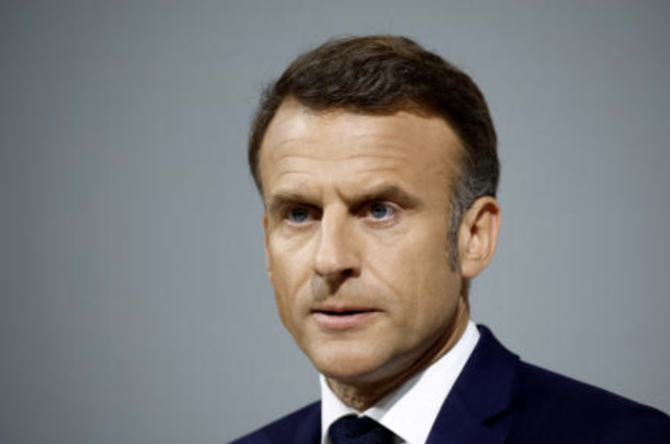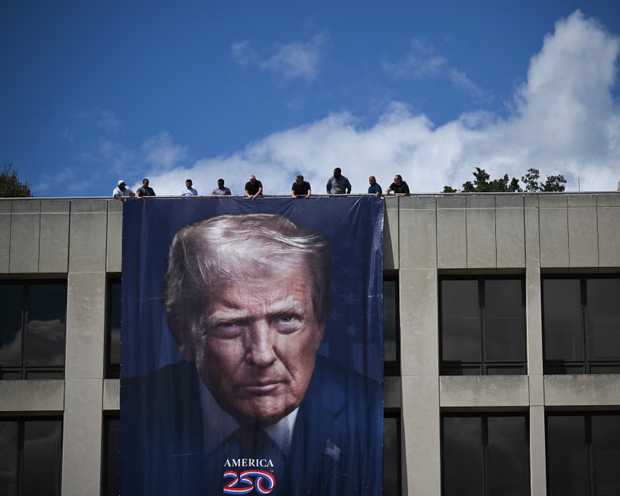Andrew Hammond
American writer Mark Twain is widely credited as the originator of the phrase: “History never repeats itself but it often rhymes.” This alludes to the potential patterns that can be observed in certain events over time.
While the French political system is very different to that of the US, parallels were being drawn as early as 2017 between the careers of Presidents Emmanuel Macron and Barack Obama. Though their terms in office did not overlap, they share many similar personal characteristics, including charisma and the perceived status of “insurgent” in the ways they won control of their nations’ top political offices.
In 2017, the dynamic, daring Macron upended the longstanding French political duopoly of the right-of-center Republicans and the left-of-center Socialists to win power. Obama also rocked the political boat in the US, yet even at the start of Macron’s first presidential term, some commentators wondered whether there might be another, later parallel to be drawn between the two leaders: the “end game” of their respective presidencies.
More specifically, whether just as the populist, right-wing maverick Donald Trump succeeded Obama as US president in 2017, Macron’s popularity might decline to such a degree in the 2020s that his successor would be the far-right, euroskeptic leader of the National Rally, Marine Le Pen, who finished in second place at the 2017 and 2022 elections.
Fast forward to 2024, and the possibility of Le Pen becoming the next French president is increasingly plausible. For those who did not see this coming, the European Parliament election results this month suggested it was a growing possibility; her National Rally party won the most votes by far across France, double the amount for its closest rival, Macron’s centrist alliance. In so doing, the National Rally came first in more than 90 percent of communes, or local districts.
It was this debacle that prompted Macron on June 9 to take the biggest gamble of his presidency so far by dissolving the National Assembly, the lower house of the nation’s parliament, and calling a snap national election. It will take place in two stages, on June 30 and July 7.
It is possible that Macron’s centrist alliance might defy the polls, which predict it will come third behind a victorious National Rally, which is seeking to co-opt the votes of moderate, right-of-center Republicans. Second place would likely go to the united left, comprising the radical, leftist Unbowed France, the Greens and the Communists.
However, the key question, according to most polls, is not whether National Rally, which currently has 88 seats in the National Assembly, will win the most votes but whether it can secure the 289 seats it needs for an overall majority, which would be a huge slap in the face for Macron.
It would leave him to potentially limp on in the office of president until 2027 during a period of so-called “co-habitation” with a far-right government or, a much more unlikely scenario, resign as Charles De Gaulle did in 1969.
There is no firm consensus on why Macron chose to call a snap election given the risks that are in play. However, there might possibly be some method to what many consider his political madness.
Firstly, the president has lacked a parliamentary majority since the 2022 election and was heading for a no confidence motion later this year over the budget that would have probably seen his centrist government fall anyway. Macron previously said: “It is better to write history than to submit to it.” From this perspective, his decision represents a bold, proactive choice to force a dissolution on his own terms.
A second probable reason why Macron decided to call an election is his belief that if the National Rally does win and forms a government with powers over domestic policy, including tax and spending, this could undercut the party’s popularity as it faces the reality of wielding power in a tight fiscal context. This might reduce the possibility of a Le Pen presidential victory in 2027.
Macron’s calculations here might well have been that if National Rally remained outside of power, the party and Le Pen herself might continue to grow increasingly popular and win the presidency, possibly comfortably, in 2027. This would be a massive blow to his legacy, just as the election of Trump was to Obama’s in the US. It might even potentially result in the collapse of “Macronism” as a centrist political project.
While Macron’s success, or otherwise, in foiling Le Pen’s presidential prospects will not be clear until 2027, his election gamble is already having not only political consequences but significant economic ones for France. Markets have been volatile and Finance Minister Bruno Le Maire has warned that a National Rally victory would spark a financial crisis in the eurozone’s second-largest economy due to tens of billions of euros of proposed extra borrowing.
Specifically, Le Maire cited the possibility of a “Truss-style scenario.” This referred to Liz Truss, the former UK prime minister, and the crisis in the bond markets that ultimately led to her departure from 10 Downing Street in October 2022, after only 50 days in office.
Meanwhile, the European Commission warned last week that France’s economic plans imply spiraling debt levels that demonstrate “high risks over the medium term.” According to its baseline 10-year projection, the EU expects France’s debt ratio to rise to about 139 percent of gross domestic product by 2034, compared with about 110 percent now.
Macron’s gamble is therefore a huge one, politically and economically. While the results on July 7 will give the first indication of whether he is vindicated for his roll of the dice or not, a full assessment of the outcomes of his decision might not be clear until the 2027 elections.







